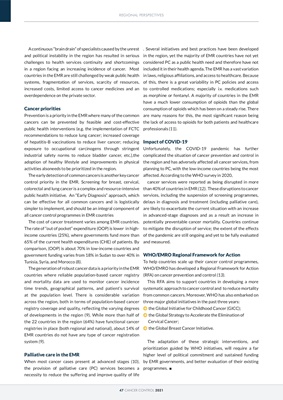
REGIONAL PERSPECTIVES
47 CANCER CONTROL 2021
A continuous "brain drain" of specialists caused by the unrest
and political instability in the region has resulted in serious
challenges to health services continuity and shortcomings
in a region facing an increasing incidence of cancer. Most
countries in the EMR are still challenged by weak public health
systems, fragmentation of services, scarcity of resources,
increased costs, limited access to cancer medicines and an
overdependence on the private sector.
Cancer priorities
Prevention is a priority in the EMR where many of the common
cancers can be prevented by feasible and cost-effective
public health interventions (e.g. the implementation of FCTC
recommendations to reduce lung cancer; increased coverage
of hepatitis-B vaccinations to reduce liver cancer; reducing
exposure to occupational carcinogens through stringent
industrial safety norms to reduce bladder cancer, etc.),the
adoption of healthy lifestyle and improvements in physical
activities alsoneeds to be prioritized in the region.
The early detection of common cancers is another key cancer
control priority in the EMR. Screening for breast, cervical,
colorectal and lung cancer is a complex and resource-intensive
public health initiative. An "Early Diagnosis" approach, which
can be effective for all common cancers and is logistically
simpler to implement, and should be an integral component of
all cancer control programmes in EMR countries
The cost of cancer treatment varies among EMR countries.
The rate of "out of pocket" expenditure (OOP) is lower in highincome countries (25%), where governments
fund more than
65% of the current health expenditures (CHE) of patients. By
comparison, (OOP) is about 70% in low-income countries and
government funding varies from 18% in Sudan to over 40% in
Tunisia, Syria, and Morocco (8).
The generation of robust cancer data is a priority in the EMR
countries where reliable population-based cancer registry
and mortality data are used to monitor cancer incidence
time trends, geographical patterns, and patient's survival
at the population level. There is considerable variation
across the region, both in terms of population-based cancer
registry coverage and quality, reflecting the varying degrees
of developments in the region (9). While more than half of
the 22 countries in the region (64%) have functional cancer
registries in place (both regional and national), about 14% of
EMR countries do not have any type of cancer registration
system (9).
Palliative care in the EMR
When most cancer cases present at advanced stages (10),
the provision of palliative care (PC) services becomes a
necessity to reduce the suffering and improve quality of life . Several initiatives and best practices have been developed
in the region, yet the majority of EMR countries have not yet
considered PC as a public health need and therefore have not
included it in their health agenda. The EMR has a vast variation
in laws, religious affiliations, and access to healthcare. Because
of this, there is a great variability in PC policies and access
to controlled medications; especially i.v. medications such
as morphine or fentanyl. A majority of countries in the EMR
have a much lower consumption of opioids than the global
consumption of opioids which has been on a steady rise. There
are many reasons for this, the most significant reason being
the lack of access to opioids for both patients and healthcare
professionals (11).
Impact of COVID-19
Unfortunately, the COVID-19 pandemic has further
complicated the situation of cancer prevention and control in
the region and has adversely affected all cancer services, from
planning to PC, with the low-income countries being the most
affected. According to the WHO survey in 2020,
cancer services were reported as being disrupted in more
than 40% of countries in EMR (12). These disruptions to cancer
services, including the suspension of screening programmes,
delays in diagnosis and treatment (including palliative care),
are likely to exacerbate the current situation with an increase
in advanced-stage diagnoses and as a result an increase in
potentially preventable cancer mortality. Countries continue
to mitigate the disruption of service; the extent of the effects
of the pandemic are still ongoing and yet to be fully evaluated
and measured.
WHO/EMRO Regional Framework for Action
To help countries scale up their cancer control programmes,
WHO/EMRO has developed a Regional Framework for Action
(RFA) on cancer prevention and control (13).
This RFA aims to support countries in developing a more
systematic approach to cancer control and to reduce mortality
from common cancers. Moreover, WHO has also embarked on
three major global initiatives in the past three years:
J the Global Initiative for Childhood Cancer (GICC);
J the Global Strategy to Accelerate the Elimination of
Cervical Cancer;
J the Global Breast Cancer Initiative.
The adaptation of these strategic interventions, and
prioritization guided by WHO initiatives, will require a far
higher level of political commitment and sustained funding
by EMR governments, and better evaluation of their existing
programmes. n